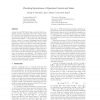1142 search results - page 32 / 229 » Is the Brain a Quantum Computer |
TCC
2004
Springer
14 years 3 months ago
2004
Springer
Quantum 2-party cryptography differs from its classical counterpart in at least one important way: Given blak-box access to a perfect commitment scheme there exists a secure 1−2...
COCO
2005
Springer
14 years 3 months ago
2005
Springer
Consider a two-party quantum communication protocol for computing some function f : {0, 1}n × {0, 1}n → Z. We show that the first message of P can be compressed to O(k) classi...
PPL
2010
13 years 8 months ago
2010
Rank-varying computational complexity describes those computations in which the complexity of executing each step is not a constant, but evolves throughout the computation as a fu...
STOC
2007
ACM
14 years 10 months ago
2007
ACM
We study properties of quantum strategies, which are complete specifications of a given party's actions in any multiple-round interaction involving the exchange of quantum in...
ICCAD
2007
IEEE
14 years 6 months ago
2007
IEEE
Among the post-CMOS technologies currently under investigation, quantum computing (QC) holds a special place. QC offers not only extremely small size and low power, but also expon...

